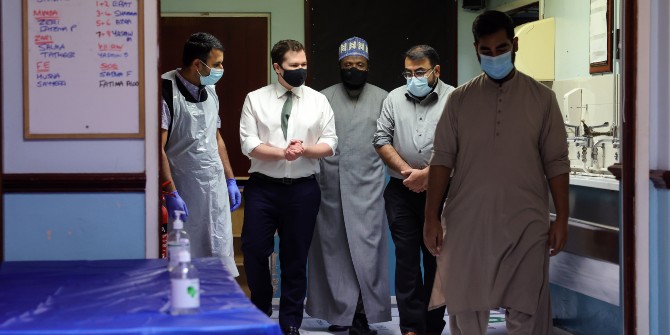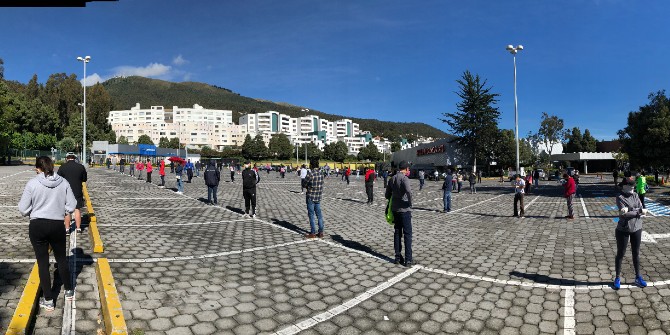Some ethnic groups in England are more likely to refuse the COVID vaccine than others. Miqdad Asaria (LSE), Joan Costa-Font (LSE) and Faical Akaichi (SRUC) report on an LSE survey that explores the reasons for their hesitancy and looks at which incentives might make a difference.
With the initial phase of the COVID-19 vaccination programme in England almost complete, uptake has now plateaued in the adult population. Coverage is patterned by age, with those in older age groups much more likely to be vaccinated than the young. Coverage in people over 70 years of age exceeds 95% but has remained at a more modest 65% in those between the ages of 18 and 30. It also varies widely across ethnic groups with very high rates of vaccination among the White British population and much lower vaccination rates in some other ethnic groups, such as the Black Caribbean and Pakistani communities.
As we approach the second winter of the pandemic, there are still over 40,000 confirmed new cases and over 200 deaths attributed to the virus occurring in England every day. The vast majority of these cases and deaths are occurring in unvaccinated members of the population, highlighting the value of convincing those who are still unjabbed to take the vaccine.
The government policy response to lower vaccination rates in minority ethnic populations has largely been predicated on a ‘deficit model’, where people from minority ethnic communities are assumed to be culturally and behaviourally deficient as compared to the White British majority. This is reminiscent of the policy response following the disproportionately high numbers of deaths among minority ethnic populations in the first wave, which was incorrectly assumed by policy makers to be due to biological and cultural deficiencies in these same populations. Research has shown that those disproportionate impacts were in fact due to structural factors in society that meant certain groups in the population were more exposed to the virus, due to their over-representation in higher risk jobs and the poor living conditions they were likely to endure.
Negative attitudes to COVID vaccination were highest in people belonging to Caribbean and Eastern European ethnic groups
Given this context, we embarked on a project to investigate the factors that have led to the differences in attitudes towards vaccination across different ethnic groups. We conducted an online survey funded by the LSE Research Support Fund in September 2021 asking about attitudes towards COVID vaccination. We had 458 respondents to our survey which were split roughly equally across eight key ethnic groups: African; Bangladeshi; Caribbean; Chinese; Eastern European; Indian; Pakistani; and White British.

We found that negative attitudes to COVID vaccination were highest in people belonging to Caribbean and Eastern European ethnic groups, among whom almost a third of respondents said they were unlikely or very unlikely to take the vaccine. Significant levels of vaccine hesitancy were also observed in African and Pakistani ethnic groups, while positive attitudes to vaccination were highest among people from White British, Chinese, Indian and Bangladeshi ethnic groups.
People who were vaccine hesitant, regardless of their ethnic group, had strong concerns about the efficacy, safety and side-effects profile of the vaccine. These people also had much lower levels of trust in advice received from doctors, scientists and the NHS. In some communities (most strikingly among people of Caribbean ethnicity but also amongst those of African, Pakistani and Bangladeshi ethnicities), participants reported experiencing very high levels of chronic discrimination. These respondents were also much more likely to report previous negative experiences in their interactions with the NHS or the government. These experiences likely explain some of their distrust in the official advice regarding the COVID vaccine and their resulting high levels of concern.
Another key pattern observed amongst some of those who were vaccine hesitant was that they felt at lower risk of contracting the virus and suffering serious consequences in the near future. These respondents typically were also much less likely to trust traditional sources of news media. This pattern was particularly prevalent amongst participants of Eastern European ethnicity.
Some felt at a significantly higher risk of contracting and suffering from severe consequences of COVID while also having suffered high levels of discrimination, an increased likelihood of negative experiences of the health services, and a high degree of concern regarding the safety and efficacy of the vaccine. For these people it seems that the increased level of risk they felt was enough to override their concerns regarding the jab, leaving them largely in favour of vaccination. Such patterns were most often observed among participants of Bangladeshi ethnicity.
If they were given a choice of vaccine, a fifth of vaccine-hesitant respondents reported they would take it
We found little evidence to support the existing policies that have been used to overcome vaccine hesitancy in minority ethnic communities, such as promoting vaccination through community or religious leaders and providing vaccines at community centres or places of worship. In fact, those who were vaccine hesitant had lower levels of trust in community and religious organisations than the other survey participants and were also less likely to be politically engaged.
Finally, we asked participants how various policies might change their attitudes towards vaccination, ranging from giving people the choice of which of the available vaccines to take, to providing financial incentives and making it a mandatory condition for continued employment. We found that policies such as mandatory vaccination and financial incentives had polarising effects on our vaccine hesitant respondents – some reported that such policies would convince them to take the vaccine, but higher numbers said that such policies would fuel their distrust and further decrease their likelihood of getting vaccinated. The most promising of the policies we asked about was providing a choice regarding which of the available vaccines to take. Given this choice, a fifth of vaccine-hesitant respondents reported they would take it.
We find no evidence in our research that the lower levels of uptake of the COVID vaccines in minority ethnic populations are due to deficits in the cultures or behaviours of ethnic minority populations. Instead, our findings suggest that these lower rates of vaccination are due to failures of the government and the media in establishing trust with people from minority ethnic communities. We also find that while distrust lies at the heart of much of the observed vaccine hesitancy, there is significant heterogeneity in the causes of this distrust and how it interacts with attitudes to vaccination, both across and within the different minority ethnic groups. Policymakers and journalists who want to act to protect all groups in the population during the pandemic would do well to carefully understand and honestly engage with these various causes of distrust.
This research was funded by the LSE Research Support Fund and conducted by Miqdad Asaria (LSE), Joan Costa-Font (LSE) and Faical Akaichi (SRUC). The post represents the views of the authors and not those of the COVID-19 blog, nor LSE.





